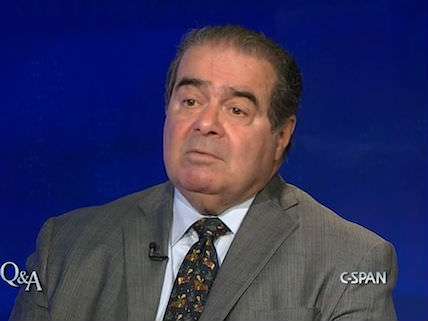Scalia Attacks Alito for Undermining 6th Amendment Right of Criminal Defendants to Confront Witnesses
SCOTUS grapples with the Confrontation Clause in Ohio v. Clark.

In his 2004 majority opinion in the case of Crawford v. Washington, Justice Antonin Scalia held that law enforcement officials violated the Constitution when they introduced into evidence a testimonial statement made to the police by a wife describing her husband's involvement in an alleged murder. Because the husband "had no opportunity to cross-examine her," Scalia held, his rights under the Confrontation Clause of the Sixth Amendment had been violated. According to the Confrontation Clause, "In all criminal prosecutions, the accused shall enjoy the right…to be confronted with the witnesses against him."
Crawford was a watershed case in modern Sixth Amendment jurisprudence. Among other things, it overruled the Supreme Court's 1980 decision in Ohio v. Roberts, in which the Court had allowed prosecutors to introduce into evidence a "reliable" statement made by a witness who was unavailable for cross-examination during a forgery trial. In other words, Scalia's decision in Crawford repealed a precedent that gave law enforcement officials a leg up and replaced it with a precedent that gives some additional protection to criminal defendants.
Earlier today, the Supreme Court decided another Confrontation Clause case. Writing for the majority this morning in Ohio v. Clark, Justice Samuel Alito held that the Confrontation Clause was not triggered when prosecutors introduced into evidence a statement made by a 3-year-old boy to his preschool teachers about crimes committed by the boyfriend of the boy's mother. "In Crawford," Alito observed, "we defined 'testimony' as 'a solemn declaration or affirmation made for the purpose of establishing or proving some fact." Because neither the young boy nor his teachers "had the primary purpose of assisting in Clark's prosecution," those statements did not rise to the level of testimony "and therefore were admissible at trial" even though the child was not available for cross-examination.
That judgment is consistent with Crawford. But Alito went further, describing Crawford as merely "a different approach" from what the Court previously held in Ohio v. Roberts (rather than a repudiation of the 1980 case), and in fact Alito even suggested that Ohio v. Roberts might still be relevant in future Confrontation Clause disputes.
That suggestion proved to be too much for Justice Scalia to swallow. "I write separately," Scalia fumed, "to protest the Court's shoveling of fresh dirt upon the Sixth Amendment right of confrontation so recently rescued from the grave in Crawford v. Washington." Justice Ruth Bader Ginsburg, who frequently sides with Scalia in criminal justice cases, signed on to today's anti-Alito protest.
In other words, prepare for war between Scalia and Alito when the next Confrontation Clause case arrives at the Supreme Court.
The opinion in Ohio v. Clark is available here.


Show Comments (40)